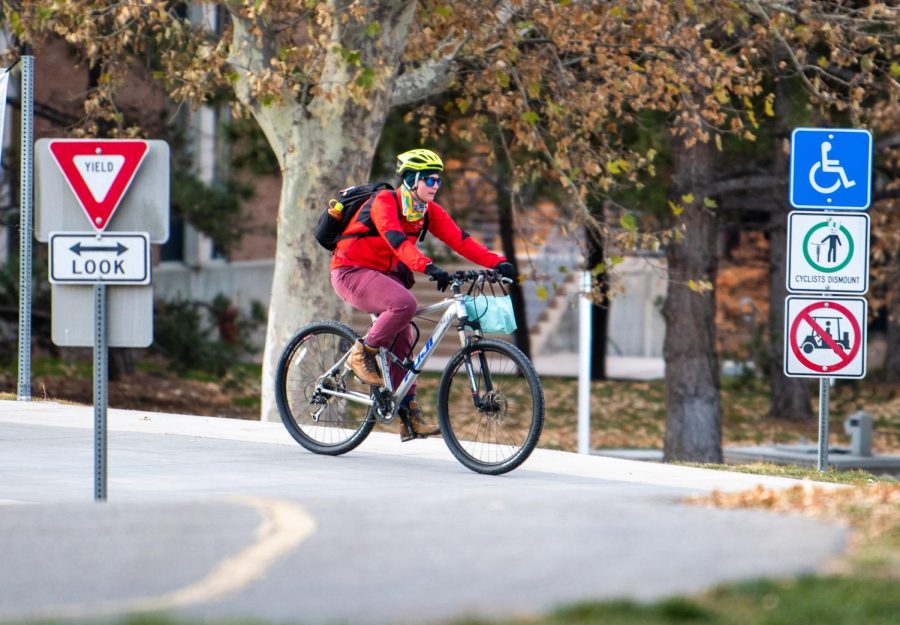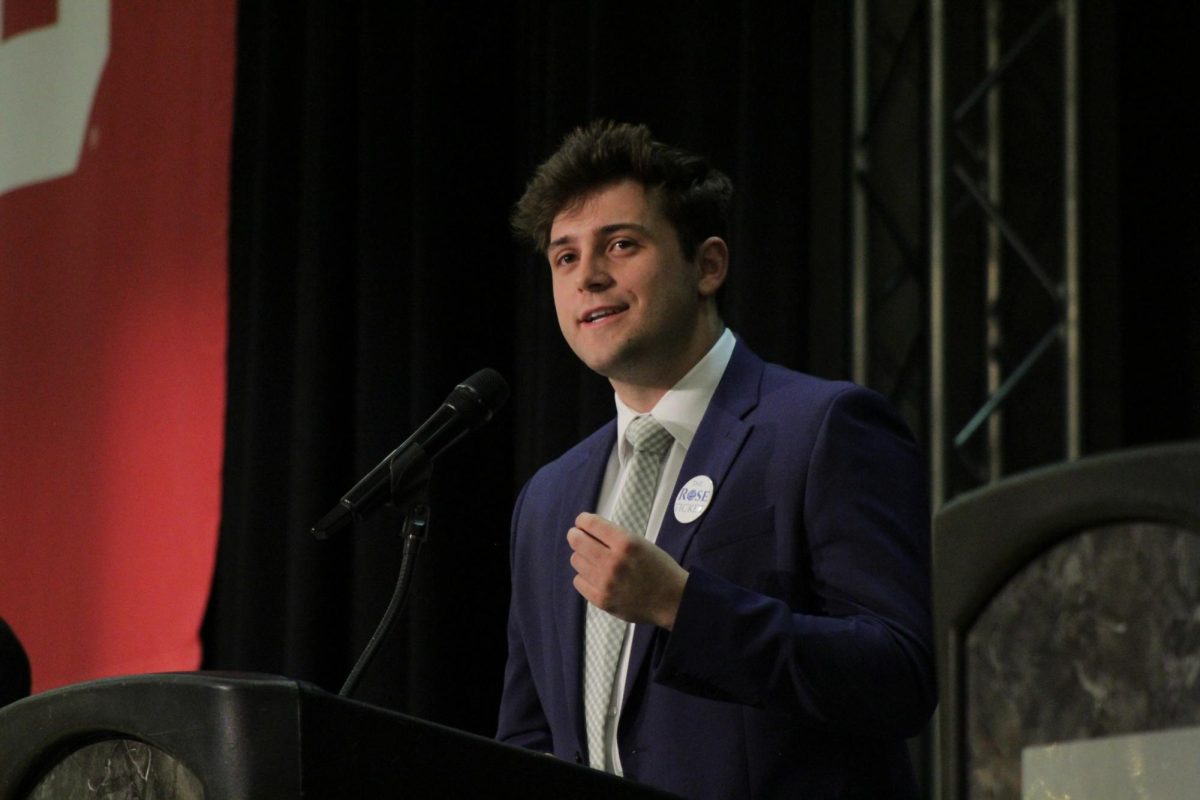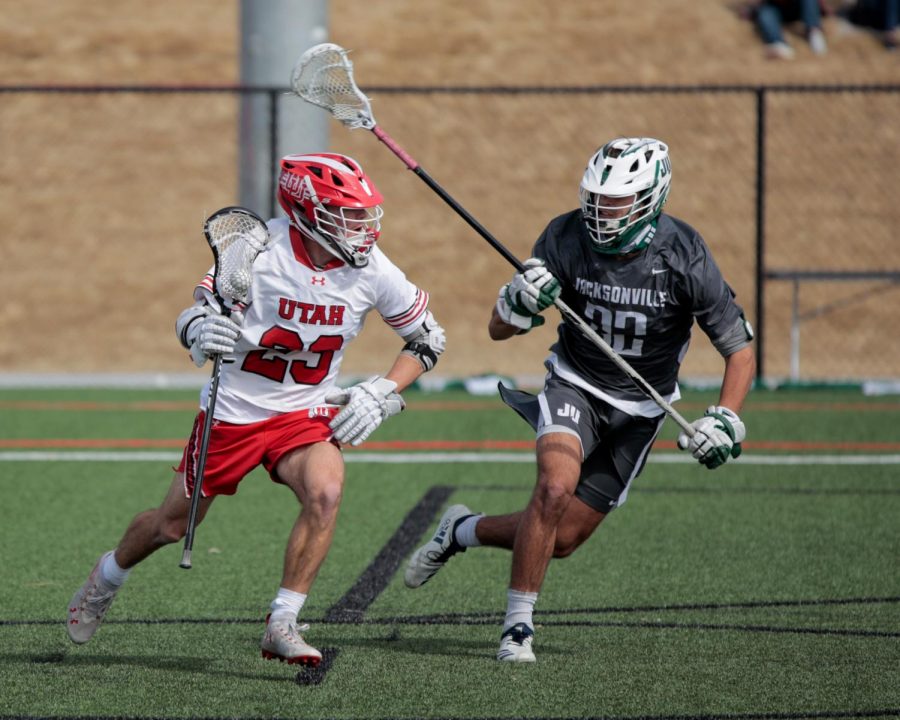Bringhurst: Switch Gears to Biking
A student biker biking across campus at the University of Utah in Salt Lake City on Dec. 5, 2021. (Photo by Jonathan Wang | The Daily Utah Chronicle)
December 10, 2021
The University of Utah is a designated Gold Bicycle Friendly University. Students take part in the annual UBike Week, which encourages and incentivizes biking on campus. Biking is popular, so when I transferred from Utah State University I was surprised to find that the U’s only student bike rental option is for a mountain bike, which costs $25 a day, rising to $50 on weekends. This might be a fun option for a day up the canyon, but it isn’t sustainable and affordable for students.
With Salt Lake City’s poor air quality and the U’s lack of parking, an accessible bike rental option is necessary now more than ever. Providing students with bikes would be better for the environment, our mental health and alleviate the parking problem.
Why Now?
Offering students affordable bike rentals would improve Salt Lake’s air quality and solve the U’s parking monstrosity. Ask any student, and they will personally testify that Salt Lake City’s air quality is some of the worst in the world. Residents are familiar with inversion, and more than two-thirds of Utahns are concerned about air quality. Though inversion is largely due to the topography of Utah, vehicle emissions have the greatest impact on the air quality in the Wasatch Front. Over half of students and faculty drive alone to the university, though this number mostly consists of faculty, according to the Sustainability Office’s Active Transportation Manager, Ginger Cannon.
The environment isn’t the only victim of overabundant cars at the U. Students frequently express frustration finding a parking spot. Parking spots to permits ratio is higher at the U than other colleges. Campus parking permits are also expensive, ranging from $145 to $348 a semester. This may be an attempt to deter people from driving without providing a viable alternative necessary to solve the parking problem.
Benefits of Bikes
An affordable bike rental program for students at the U would have positive impacts on both the environment and mental health.
Bike share systems such as one in Edinburgh can save between 789 and 4739 tons of CO2 per year, according to an assessment by Sustainable Cities and Society. Reducing pollution from cars is one significant way to improve air quality and create positive climate action.
Exposure to high levels of pollution can lead to an increased risk of serious mental health issues. Up to 44% of college students report having symptoms of depression and anxiety, according to the Mayo Clinic Health System. Exercise works wonders to improve mental health, especially biking. Many students don’t have time to dedicate to the gym, but biking across campus is an easy way to stay active.
What is Stopping Us?
Other colleges had success implementing campus bike rental programs. Many students at Utah State University take advantage of the Aggie Blue Bike program, which allows students to check out a bike for a semester at no cost. It is subsidized by student fees and grants and has been operating for over a decade. During my time at Utah State, I was impressed by the students’ collective love for the program despite the campus’s hilly terrain. Accessibility to bikes made me feel safer and more connected. Southern Utah University also offers student bike rentals for $50 a semester.
The U could have success in modeling a bike program after these initiatives. So what is stopping the U? According to Cannon, a lack of priorities among leadership. “I can give you thousands of examples of decisions made that are about vehicles being able to park on campus conveniently. I can give very few examples of leadership making decisions that prioritize walking and biking and public transit over vehicular use.”
The inability to implement a bike-share program comes down to funding and infrastructure. The U’s transportation funding is overwhelmingly allocated to building roads and parking garages rather than sustainable options. If facilities wished to build a bikeway over a parking area, it would cost $22,000 to remove a single parking space, according to Cannon. As the U continues building parking garages, it prevents potential sustainable initiatives in the future.
The Power of Student Voices
Like other sustainable initiatives at the U, a bike-share program would require a significant push from students. Until students make a fuss, faculty won’t push for the necessary changes in funding and infrastructure to make campus more bike-friendly.
There is a demand for bikes among students on campus. Students will use bikes if they have access to them. In recent years, USU considered cutting the student fees dedicated to Aggie Blue Bikes, but students fought to keep it because it has made such a difference on campus.
Students can voice their concerns about current transportation infrastructure using the SafeU app, or report directly to commuter services.













